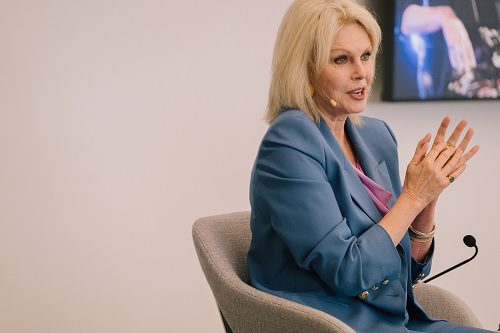Model of change – Liberty Specialty Markets Phil Hobbs shares his standout interview moments with Dame Joanna Lumley

Phil Hobbs Liberty Speciality Markets, President & Managing Director shares the standout moments from his interview at a Unique Perspectives event with Dame Joanna Lumley, and the parallels we can draw between her achievements and our ever-changing industry.
Dame Joanna Lumley began her career as a model. In the sixties, if you could stand up, you could be a model she told me. This cheerful and forthright national treasure – film star, activist, single mother, author, and Tony Award winner – makes almost everything sound effortless, but beneath the surface is a story of overcoming challenge.
When I spoke with her in July, I found remarkable parallels for all of us who work in the London Market. The changing world has forced Lloyd’s to shift with the times, become more agile, and embrace change. In this respect Dame Joanna is a model for us all.
I asked her about how she coped with being a single mother, a meningitis scare and the pressure this put on her mental health, and the battle to remain relevant. She acknowledged the power of celebrity, something Lloyd’s shares and explained her constant reinvention in response to circumstances, from model to actress to campaigner to eco-warrior. This evolution has helped her to overcome obstacles that would have brought down less-driven individuals. As the insurance industry stalwarts head towards retirement, Lloyd’s and the London Market would do well to follow her lead.
In the beginning
Early in her career, Lumley admits opportunities seemed limitless, “It was as if I’d jemmied open the back window of a huge house full of treasures,” she recalls launching her acting career via appearances on the Bruce Forsyth Show in 1966, a TV ad for bread in 1969, and finally, her breakthrough role in the Bond film On Her Majesty’s Secret Service.
Saying yes to every role included exhausting work in West End shows. She worked tirelessly to give producers and directors what they needed, and to keep her mind open. She says that in acting you have to learn everything – lines, where your lighting will shine, everything… But the rewards for her tireless efforts were scant in those days. Back to work too soon after the birth of her baby, she was doing eight shows a week with little money.
Overcoming frayed edges
At times the gruelling schedule was too much, and it began to take its toll on her mental health when she began to hallucinate. “I stopped being able to summon enough courage even to go to the shops,” she remembers. Most of her day was taken up by consciously breathing. Eventually she asked herself ‘how do I get out of this deep pit?’” knowing only she could be the one to truly set herself free.
We shall overcome
With her mental health challenges managed through sheer determination, when she returned to work, new obstacles emerged. She’d always found learning her lines easy, but that gift was snatched away when her photographic memory was wiped out by viral meningitis. It was the hardest moment in her life.
She overcame that too. The four-season, small-screen success Sapphire & Steel followed, and the Pink Panther films with Peter Sellers only grew her reputation with her name familiar to everyone with a TV or who went to the cinema.
Yet as everyone in the Lloyd’s market knows, remaining relevant requires more than just familiarity and the public’s admiration. If that was enough, Dame Joanna – and Lloyd’s – could just ride on the proverbial coattails. Instead, it takes agility, and the ability to read what your audience – whether fans or insurance buyers – really want.
Remaining relevant
In 2008 she became the public face of the Gurkha Justice Campaign, which aimed to guarantee all Nepalese-origin Gurkha veterans who had served in the British Army before 1997 the right to settle in the UK.
The cause was close to her heart as her father had served in the Gurkhas. “They didn’t have parity with other Commonwealth veterans, because Nepal wasn’t in the Commonwealth.” They would often serve 15 or even 20 years, then “be shipped out to Nepal like criminals the day their service ended,” she says, her real indignation at this injustice showing.
“They are the bravest, most loyal, the funniest… they’d fought for this country for 200 years and paid their taxes. But human rights are currently under assault: if you can’t pay, you can’t get justice.” So, she put her talent and familiarity with the British people to good use in the fight.As these heroes’ champion, she led a march to 10 Downing Street armed with a petition signed by 250,000 people. However, a parliamentary motion failed, and the new Immigration Minister kicked the Gurkha issue into the long grass by announcing a review. When she met the new Prime Minister Gordon Brown at an event she raised the issue once again and this time she prevailed.
A third coming
Dame Joanna has embraced environmentalism and thrown her considerable clout behind efforts to improve the world. One of many beneficiary organisations has been Survival International, which campaigns for the rights of indigenous peoples. Spurred on by deforestation in the forests of Sarawak in Borneo, she was shocked when she saw that after the trees were cut down for cement-holding and disposable chopsticks, the rain washed the topsoil away, contaminating rivers and farmland.
Once again she refocussed her skills and leveraged her movie business connections, by making documentary films that illustrated the challenges in Sarawak, and the plight – of its indigenous peoples.
Eco-warrior
She leads by example on environmental and social issues because. “You can’t just tell people ‘Be good guys’. Like cladding on buildings, it’s no use saying, “it’s up to you to do the right thing.”
Like Lloyd’s efforts to go digital, she sees technological solutions to some of the world’s intractable problems. She’s full of ideas, for countries to adopt hydrolysis and consider small nuclear reactors. She suggested that the nuclear waste be sent to space and form a collection-ring of lovely colourful satellites, to deal with when we have the technology. She would burn plastic to power steelworks, to make Britain a steel-producing nation once again and would protect the Great Barrier Reef, which she says is vital to the atmosphere and the planet, not just a tourist attraction.
Her wise words should be heeded by our market, which needs to change to remain relevant, to think creatively and embrace ideas, to be tenacious. If we are to recruit successfully to fill the looming talent gap, we must follow her lead and develop the ability to adapt and change. Like Dame Joanna has already done, we need to figure out what we want to do, and how we’re going to get there.





